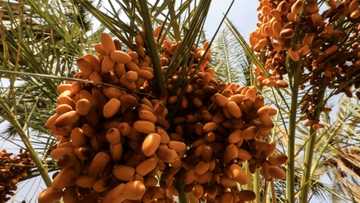Russia Bombs Ukraine’s Grain Stores: Why Should Nigerians Care?
- Russia launched airstrikes on Ukraine's grain storage facilities at Black Sea Port in Odesa, destroying tonnes of the country's grain
- Nigerian economists have warned the attack could adversely affect the country's food security and destabilise its economy further
- Nigeria depends on other countries, including Ukraine, for the supply of grains, which includes wheat, to meet its market demand that local production has consistently failed to meet for decades
- In 2021, the volume of trade with goods and services between Nigeria and Ukraine countries was USD 196.7 million, with Nigeria mainly importing cereals, ferrous metals, starchy products, sugar and confectionery and foodstuffs
PAY ATTENTION: Click “See First” under the “Following” tab to see Legit.ng News on your Facebook News Feed!
On Monday, September 25, Russia unleashed airstrikes that destroyed Ukraine's grain storage facilities at the Black Sea Port in Odesa, dealing a big blow to dozens of countries that depend on Kyiv's grain to meet shortages.
"The attack resulted in the destruction of grain storage facilities and significant damage to the seaport," Economy Minister Yulia Svyrydenko said on X.

Source: Getty Images
Recent reports indicate that Ukraine has lost nearly 15% of its grain storage capacity amid its invasion by Russia, threatening its role as a key food supplier to the world.
This is according to a new report by the US government-backed Conflict Observatory.
PAY ATTENTION: Follow us on Instagram - get the most important news directly in your favourite app!
The report reveals that Russians had seized 6.24 million tonnes worth of food storage capacity and that another 2.25 million tonnes of capacity in Ukrainian hands had been destroyed.
In total, the Russian invasion of Ukraine has removed around 8.5 million of Ukraine's 58-million-tonne storage capacity, threatening the country's future ability to get crucial supplies of wheat, corn and sunflower oil to the world market, according to the report.
"Russia and Russia-aligned forces' damage and seizure of Ukrainian crop storage capacity threatens to turn Ukraine's current agricultural crisis into catastrophe," the report said.
Russia has continued to hit Ukrainian port infrastructure and grain storage facilities in drone strikes.
Paul Alaje, the Chief Economist and Partner at SPM Professionals told Legit.ng that the bombarding of the Ukraine grain facilities by Russia will have negative effects on Nigeria’s “volatile” economy.
Alaje noted that every country that depends on Ukraine for grain or other products whose inputs contain grain will also be negatively impacted.
What does Nigeria import from Ukraine?
Nigeria’s strategic reserve is not enough, and the country’s volume of harvest in terms of grain is too low to meet local demands, Alaje told Legit.ng.
“As a result, we have always depended on other countries, including Ukraine, for the supply of grain, which includes wheat, but is not limited to that,” the economist said.
In 2021, the volume of trade with goods and services between Nigeria and Ukraine was USD 196.7 million.
Nigeria mainly imported cereals, ferrous metals, starchy products, sugar and confectionery and foodstuffs.
Russia’s invasion of Ukraine in 2022 has negatively impacted the trade relations between Kyiv and Abuja.
For instance, in 2022, Nigeria reportedly recorded a 3% decrease in wheat importation.
Russia's invasion contributed to the decline in wheat imports, a development that caused a surge in wheat prices.
Russia’s latest attacks on Ukraine’s grain stores and withdrawal from the Black Sea Grain Initiative have worsened the situation.
“The implication is that the price of commodities that are made from grain will significantly increase in the coming days,” Alaje said.
“Therefore, inflation in Nigeria is expected to go high. Commodity prices, including food, are also expected to go high. Recall that the food inflation in Nigeria is close to 30% while headline inflation is 25.8%.”
Did the Black Sea Grain Initiative Help Nigeria?
Nigeria and other African countries got a sigh of relief when the UN brokered the Black Sea Grain Initiative in July 2022, in which Russia agreed not to block Ukrainian grain from reaching African markets.
By March 2023, Ukraine had delivered 140,000 tonnes of wheat to Africa under this agreement.
However, Russia pulled out of the deal in July, throwing African countries under the bus.
“Well, the Black Sea Grain Initiative really helped Nigeria. Not just because it served as “a clearing centre of some sort”, but it was also a major stay and steady point of supply for Nigeria,” the chief economist at SPM Professionals said.
“The Black Sea Grain Initiative had been really very helpful for the supply chain of commodities going to the African continent and especially Nigeria.”
Also, under its humanitarian food programme (“Grain From Ukraine”), Nigeria received 25,000 tons of grain, according to Kholostenko Ivan, Ukraine’s ambassador to Nigeria.
The Monday attack on Ukraine's grain storage facilities could point to Russia's determination to stop food shipments from Kyiv to other countries, particularly Africa.
How will these bombings affect Nigeria?
Rising Wheat Prices
Ukraine is one of the world's largest exporters of wheat. Any disruption in Ukrainian wheat production and export can lead to a global shortage, resulting in increased prices.
Nigeria imports a substantial amount of wheat for its flour industry. Higher global wheat prices would lead to increased costs for Nigerian millers, potentially leading to higher prices for wheat-based products for consumers.
Nigerian investment analyst Victor Aluyi told BBC that the current development will affect the prices of food items because many of the staples Nigerians consume are produced from wheat.
Aluyi further noted that this will affect Nigeria because the country doesn’t produce enough wheat and relies more on importation.
Disruption in Corn (Maize) Supplies
Ukraine is among the top exporters of corn globally. Any disruption in the shipment of the staple crop could have an adverse economic impact on countries that depend on it.
Nigeria is a major consumer of corn, with a large portion of it going towards human consumption as well as animal feed.
In 2017, Nigeria Imports of corn (maize) from Ukraine was US$17.83 million. Any shortage in global supply could lead to higher prices for this product in Nigeria.
Escalation of energy prices
Nigeria depends on fuel import as it does not refine its oil.
Muda Yusuf, the chief executive officer of the Centre for the Promotion of Private Enterprises, said there is a good chance that the development will disrupt oil supplies, reduce output and trigger higher prices.
Alaje told Legit.ng:
“With the recent happening, you would have seen what is going on with the price of diesel.

Read also
FG licenses companies to operate autogas plants for cheaper fuel as diesel hits N1,000/litre
“I can tell you that since the war was declared, the price of diesel has jumped from approximately N290 a litre to what we now buy it: over N1000.”
Fertilizer shortage
Nigeria relies on imported fertilizers for its agriculture. Ukraine is one of the countries that have been supplying the largest African economy with fertilizer.
In 2022, the Nigerian government blamed the high cost of fertiliser in the country on the Russian war in Ukraine.
If the supply chains are disrupted, Nigerian farmers may face challenges in accessing essential fertilizers, which could adversely impact crop yields and cause food insecurity.
There is no doubt that the Russian invasion of Ukraine is having a tremendous negative impact on Nigeria’s economy. One realistic way out is a complete halt of Moscow’s attacks on Kyiv.
“Even though Nigeria does not play a role in the war and the bombs, gunshots and missiles coming down as a result of the war is not getting to the shores of Nigeria, the hardship, the poverty, the anger is much very present among African countries and especially in Nigeria,” Alaje said.
Zelenskyy reveals why Africa should support Ukraine against Russia
Meanwhile, in a previous interview published by Legit.ng, President Volodymyr Zelenskyy called for Africa’s support for Ukraine against the Russian invasion.
The Ukraine leader highlighted why Africa cannot afford to take a neutral position, warning that Russia’s victory will lead to World War III.
Mr Zelenskyy also highlighted what Africa stands to gain by supporting Ukraine.
Source: Legit.ng









